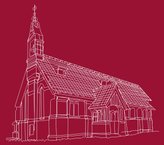Anglican Church Twente
St.Mary's of Weldam
Chaplaincy in the Diocese of Europe
Anglican Church - Who we are
Anglicans find their help and strength in a Church which is based on the Bible, clear in its tradition, identity and practice. All these gives its members responsible freedom to question and explore the truths of Christianity in the light of their own faith and reason.
The Anglican Church is a product of long historical development - It is both Catholic and Protestant, traditional and reformed. Its central belief is God as shown to us in the Person and teaching of Jesus Christ.
Its worship has been most carefully maintained in the traditions of the Church from its earliest days, as has the ministry of its bishops and priests. It is a Church which has been shaped by history, and the story starts long before the Reformation and the break with Rome in the sixteenth century.
From much earlier times there was conflict between those who believed that the individual conscience was most important and those who relied upon the authority of the Church and believed that it had all the answers. The conflict sharpened at the Reformation when those who thought that Christians should learn the faith by reading the Bible for themselves found militant allies in the Protestants who were rallying round Luther and Calvin. But there were also many people who wanted tot keep the old Catholic ways, having their faith taught them by the priest, and making the sacraments of the Church central to their lives.
The English tradition tried both ways, and settles for a compromise under Queen Elizabeth I - a Church that would always be Catholic in its traditions, practice, and the ordination of the clergy, but firmly rooted in the Bible, and held together by its worship as laid down in the Book of Common Prayer. This tradition grew to include the majority of people in England.
In the course of time the Anglican Church spread to most parts of the world. In spite of its English origins it has adapted very well to other cultures. The family of Anglican Churches in the Anglican Communion is indeed world-wide, and there are now more black Anglicans than there are white. The Anglican Church has become the spiritual home for many sorts of people with different views about some aspects of Christian teaching and practice. This seems right to Anglicans - even if it is sometimes a little uncomfortable. The Anglican view is that adult Christians should actually have to work at discovering in their daily lives what being a Christian really means. It sees the Church more as a gymnasium for training athletes than a rest home for those who want everything done for them. Quite a lot of people find this hard. They would rather be told quite clearly what to think and how to live, and they see this Anglican freedom to question and think and search constantly for the truth as a form of weakness.
Anglicans think it is strength.

